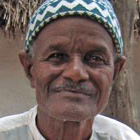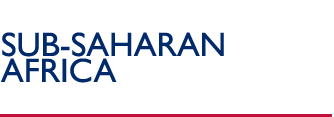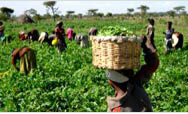Sub-Saharan Africa
 |
 |
Feature Success Story |
|
|
Launching of the West Africa Cotton Improvement Program

USAID/WA officially launched the main component of the West Africa Cotton Improvement Program (WACIP), a $27 million initiative to improve the cotton sector in West Africa. The International Soil Fertility and Soil Management Center (IFDC) will implement the main component in the four major cotton producing countries Benin, Burkina Faso, Chad and Mali.
Full Story
|
|
Overview of U.S. Foreign Assistance to Africa
The USG is providing assistance to 47 countries in Africa, and USAID currently has 23 bilateral missions in Africa. In addition, there are three regional missions that support activities in countries with a limited USAID presence. These regional missions also manage programs that aim to strengthen selected African regional institutions and organizations, to improve their capacity to contribute to Africa's development in an environment of stability and security.
U.S. foreign assistance to Africa is directed to helping African governments, institutions, and African-based organizations incorporate good governance principles and innovative approaches to health, education, economic growth, agriculture, and environment programs. USAID programs and activities in Africa in these sectors aim to ensure that development assistance supports the overall goal of transformational diplomacy-to help build sustained and well governed states that respond to the needs of their people, reduce widespread poverty, and conduct themselves responsibly in the international system.
USG Priorities in Africa
- Enhance strategic partnerships
- Consolidate democratic transitions
- Bolster fragile states
- Strengthen regional and sub-regional organizations
- Strengthen regional security capacity
- Strengthen Africa counterterrorism cooperation and capacity
- Stimulate Africa's economic development and growth
- Implement Presidential initiatives
- Focus on humanitarian and development assistance programs
|
To support the Transformational Diplomacy goal and specific development priorities in Africa, U.S. development assistance to Africa has been requested for FY 2008 across the following Foreign Assistance Objectives:
Governing Justly and Democratically ($220.3 million): To enhance stability and increase the capacity of governments to govern justly, the United States will provide support to African nations to strengthen democratic institutions, professionalize security forces, and promote key reforms. Resources will also provide assistance and build African states' resolve to fight corruption and work closely with civil society organizations as emerging constituencies for reform, helping African citizens to hold their governments accountable. Resources will also be used to improve the administration of justice for victims of domestic violence as part of Women's Justice and Empowerment Initiative, which seeks to help the governments of Benin, Kenya, South Africa, and Zambia improve their ability to investigate, prosecute, and adjudicate gender-based violence and provide support to victims.
Investing in People ($4.1 billion): Africa is the primary focus of the President's Emergency Plan for AIDS Relief (PEPFAR), which will continue to provide significant funding to African countries experiencing the most serious effects of the HIV/AIDS pandemic. Through the President's Malaria Initiative (PMI), malaria prevention and treatment will be expanded with the goal of reducing mortality by 50 percent in target countries. Through the Africa Education Initiative, effort will aim to increase access to quality education by supporting training of new teachers and providing textbooks and scholarships for children. Funds will also support water and sanitation development and conservation programs such as the Congo Basin Forest Partnership.
Economic Growth ($519.1 million): Africa's economic growth and fiscal balance indicators demonstrate a gap between its present stage of development and that of the average for the Developing countries category. Efforts to address this focus on stimulating private sector development, increasing African trade competitiveness, and integrating African nations in the global economy. Building on the success of the African Growth and Opportunity Act (AGOA), diplomatic and development resources will help facilitate increased cross-border, regional, and international trade. Efforts to break the cycle of recurrent food crises through the Africa Global Competitiveness Initiative (AGCI) and the Initiative to End Hunger in Africa (IEHA) by encouraging agricultural and economic growth interventions will be made in partnerships with other donors and regional African organizations.
Humanitarian Assistance ($376.3 million): U.S. Government programs will both prevent and respond to humanitarian crises across the continent. While activities vary across regions, the U.S. seeks to raise awareness and support for improved African disaster preparedness, mitigation, and response capacity.
The Humanitarian Situation in Sudan
 This is a time of challenge and opportunity, and USAID is helping with reconstruction, humanitarian, and food assistance. [more] This is a time of challenge and opportunity, and USAID is helping with reconstruction, humanitarian, and food assistance. [more]
Back to Top ^
|


